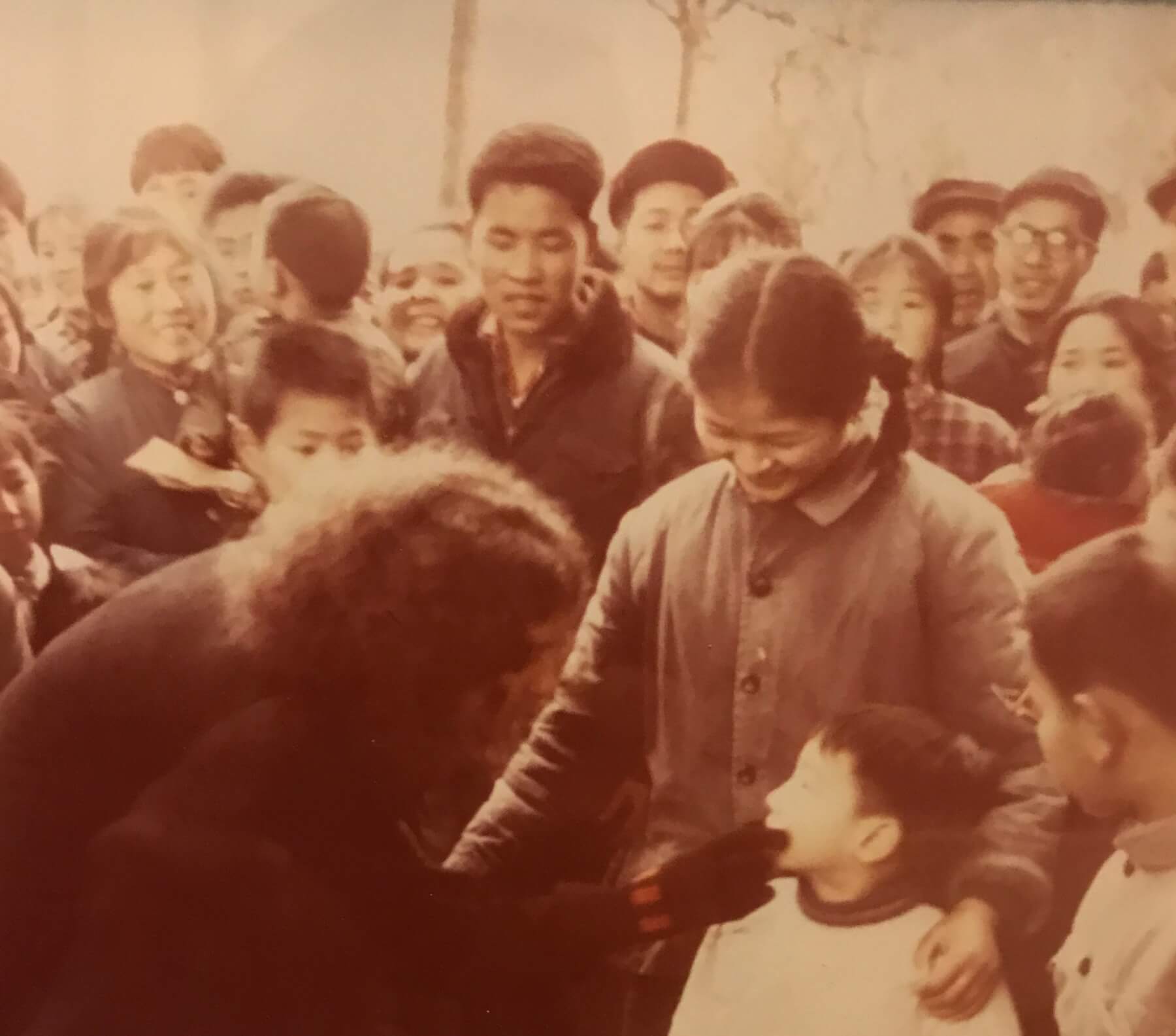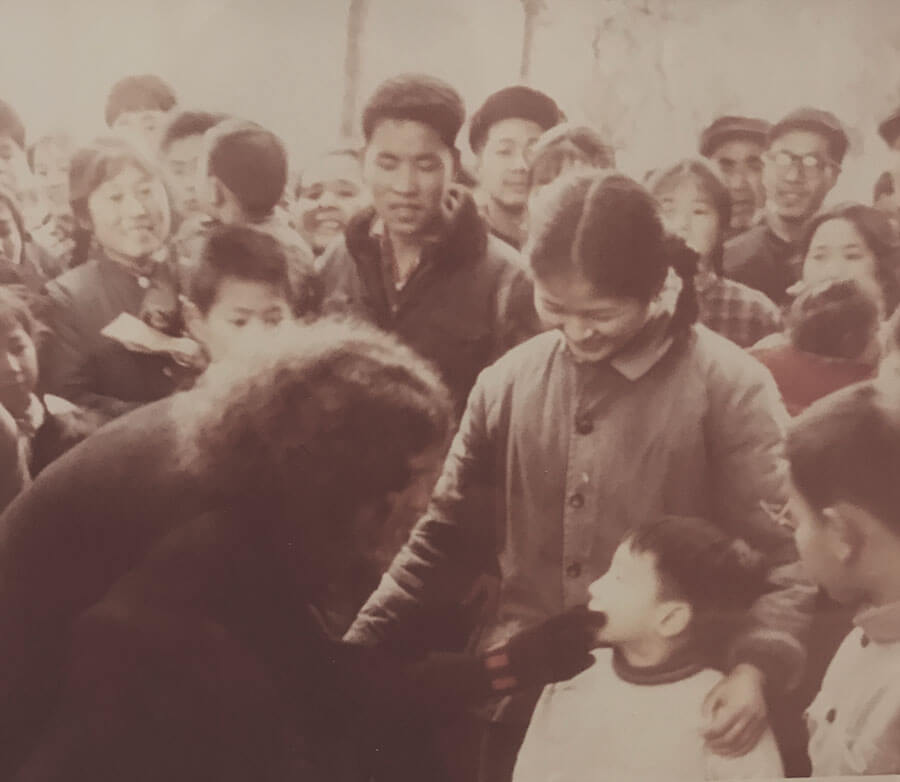Shanghai, November, 2017: I wake up early and decide to take a walk, exiting the hotel and moving onto a main street. Fashionable Chinese professionals bustle past. I see a Starbucks and dash in for a latte. No one gives me a second look, which, having reached the “invisible” stage in America, is not unusual.
Then again, I can’t help but think back.
When I arrived back at the hotel, more than a hundred strangers were behind me.
Shanghai, February, 1973: Even though we have strict orders not to stray unguided, I, an impetuous and curious 24-year-old, sneak out of the hotel one morning. I walk to the area along the waterfront where people are doing odd poses, known as Tai Chi, dressed in drab, loose garments. They notice me and word spreads fast. When I arrive back at the hotel, more than a hundred strangers are behind me. I don’t know what to do, except turn around and wave, which leads to thunderous applause.
I am later scolded, but it is difficult not to enjoy my Beatles moment. As one of the earliest batch of Americans to visit China after Mao, I later wondered if I could ever go to a museum back home that would not be emptied in advance, or a movie theatre that would not erupt into a standing ovation. Needless to say, life went rudely back to normal.
Traveling to China and Seeking a Bookend

The author attracting a crowd on her visit to China 44 years ago.
On that trip in the ‘70s, I experienced China at such a unique time that I’d always resisted returning, feeling that I could only be disappointed. But when I was recently invited to join a small group of writers for a 10-day visit, I was tempted. And hesitant. Would I feel like spending much of the day in serious meetings? Would I be depressed if it were still a male-dominated society?
But I am at a point in my life when I am seeking bookends, and on this journey, I learned things about myself—my agility and curiosity are intact!—and left feeling daunted by the country’s changes but most hopeful about the women I encountered.
In fact, my personal goal this time around was to track down one woman in particular. The daughter of a man named Sidney Shapiro, who, in 1947, left his home in Flushing, Queens, and stowed aboard a ship heading to China. There, Sidney fell in love with a beautiful actress from Shanghai, raised a daughter, Yamei (meaning part American, part Asian), and became a successful translator.
My personal goal this time around was to track down one woman in particular.
When Nixon made his unexpected overture in 1972, an acquaintance of Sidney’s became determined to track down his old Brooklyn buddy. He sent a letter addressed to “Sidney Shapiro, Peking, China.” The odds may have been a billion to one, but it worked. Shortly after, Sidney made his first return to America, where he was introduced to my father, a successful and left-leaning Los Angeles businessman. The next thing I knew, my parents and I were crossing from Hong Kong into Canton.
As a budding journalist, I was eager to find stories. This was a challenge. It was a propaganda-filled visit (“before Mao—but after Mao” began every sentence) with stops at that wall, still great, to that palace, previously forbidden, to ping-pong arenas, where players dazzled with their trigger-quick expertise.
I wrote one piece about three Americans who were living in China. These, of course, included Sidney Shapiro, who had become a revered interpreter. He was an ebullient host who entertained us in his home in a neighborhood of old alleyways. At the time, his wife was away, and his daughter—exactly my age—was at medical school. Sidney died in 2014, but with the help of a Beijing-based Stanford University official, I stepped into the same house I had visited 44 years before.
Stepping into the Same House
There I came face to face with Yamei, now a retired, divorced physician, who was joined by her 39-year-old daughter, Stella. Not unlike many families in China, they share a home, along with Stella’s American husband, and their four-year old son.
Yamei’s mother had been banished to the countryside as part of the Cultural Revolution
Though I had not met her in 1973, I told Yamei I had written a piece comparing her life to my own after I returned to the states. The article pointed out the stark differences: While I came home from school to be welcomed by a cookie-baking mom, Yamei’s mother was banished to the countryside as part of the Cultural Revolution; while I was at the movies every weekend and watching sitcoms at home, Yamei was occasionally exposed to opera, at best. Sitcoms? She hardly was allowed to smile.
My bulletin boards had been filled with fantasy heartthrobs, from Frankie Avalon to Steve McQueen. Yamei’s only heartthrob was the familiar face on every poster in the country, a man whose words filled little red books. I followed trend after trend, from straightening my hair to sporting mini-skirts. Yamei’s wardrobe remained pretty much the same, covering up what mine increasingly exposed.
Yamei, of course, was not allowed the luxury of having more than one child.
My grandmothers were immigrants, both timid, subservient women. I was struck that Yamei’s grandmother (the only one of many daughters who did not have her feet bound) apparently started the family line of outspoken women. I had a daughter, and then five years later, in my 40s, a son. Yamei, of course, was not allowed the luxury of having more than one child.
My children’s schools were always close to home, while she sent her daughter Stella to America for a full year in middle school, even though Stella spoke no English. “It was during a difficult time here, and I wanted her to see the country where her grandfather came from,” Yamei said. Stella later returned to America for college, where she met her husband.
Comparing Our Lives
Now, all these years later, Yamei and I compared our current lives. With freedom of choice in my country, I explained, I had my children when I was much older, so I have no grandchildren yet. I asked if it is easier to help raise a grandchild or her own child. “None of it is easy,” Yamei smiled.
When I told her I’d co-written a book on women dealing with aging, she said, “Many women here want to do surgery and usually go to Korea for the procedures.” Yamei had never taken that route. After spending time with this naturally beautiful gray-haired woman, I felt ashamed of all the money I have spent on coloring and filling. She, of course, lives with her daughter’s family, while our kids generally come by only for a free meal and pocket change.
As I spent hours with Yamei and Stella, I began to realize it is the women of China who are looking inward while leaping forward. “I grew up with my mother telling me I was entitled to half the sky,” says Stella, who works in public relations. Getting access to that half is still, according to some, a challenge.
After spending time with this naturally beautiful gray-haired woman, I felt ashamed of all the money I have spent on coloring and filling.
Lijia Zhang, who wrote a memoir, Socialism is Great, about being forced to work in a factory at 16, told me, “The main challenge facing women today is the deeply rooted male chauvinism.” Only now are women close to getting their retirement age moved up (to 65 rather than 60) to meet that for the men .
Fortunately, more and more women are finding power in the pen. I recently reviewed a play— staged simultaneously in New York and Shanghai—called “A Deal,” by a writer named Zhu Yi. It tells the story of a Chinese woman who attends Columbia University and decides not to return home. Her parents reluctantly join their only child. “You would never know what it’s like to love a country from the heart,” a character tells her parents. “You are told to love China, love the party, and you do so because you have no choice.”
That party ultimately disappointed the Shapiro family, whose home was close enough to hear the shots in Tiananmen Square in 1989. They still feel reluctant to publicly say so—the main difference between our societies. Yamei and Stella walked me out of their home and stood waving as I was driven away. I saw two generations of women, one still struggling with the past, one representing the future.
I certainly felt privileged to witness the extremes of China—then and now—and to see the heart of it, embodied by this mother and daughter.
Furthering Reading
Leftover in China: The Women Shaping the World’s Next Superpower
Leftover Women: The Resurgence of Gender Inequality in China





















0 Comments